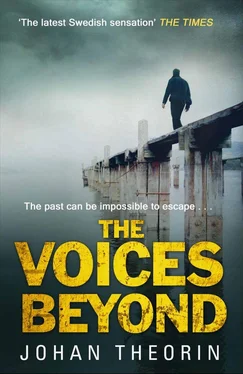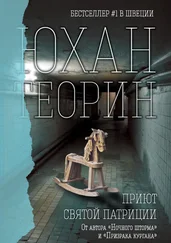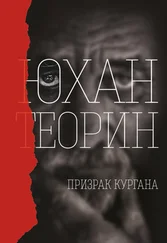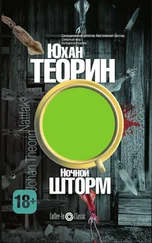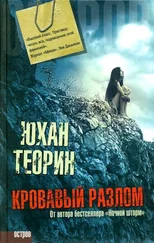Sven moves cautiously, putting his mouth close to Aron’s ear. ‘Keep calm,’ he whispers in Swedish.
‘I am calm.’
‘It’s important. We have to keep calm.’
But Sven seems anything but calm; his upper body is twisting and moving back and forth, as if he is in pain.
Aron does feel calm. He is surprised to find that he is almost enjoying the trip. This is the first time he has ever been in a car, and somehow he has the sense that he is leaving all his troubles behind. Sven keeps his eyes lowered, but Aron gazes around, studying the gun belt the man next to him is wearing. A black pistol butt is sticking up out of a holster, but he can’t see what model it is. A Mauser? He’s heard that the Soviet police usually carry Mausers.
He suddenly remembers his dream: to be a sheriff in America.
It is a long journey through the darkness, but Sven says nothing, and Aron keeps quiet, too.
Eventually, they see lights. Floodlights, on top of a black structure looming up above the forest — a watchtower, Aron realizes.
He can also see barbed wire. The car drives in through an open metal gate, which is then closed behind them. It pulls up in front of a low stone building, and Sven and Aron are led out of the car and in through a doorway.
A guard carrying a machine gun takes them down a long corridor with a cement floor, past a series of closed wooden doors.
They can hear sounds all around them, muffled thuds and loud cries.
The soldier opens one of the doors. He gives Aron a shove. ‘Get down there,’ he says.
He steps aside, and Aron sees a flight of wide stone steps plunging down into the underworld.
Gerlof has never visited the Kloss family — he has never even set foot on their land. The garden consists of a sparse but attractive rockery with viper’s bugloss and juniper bushes sheltered from the road by a stone wall. Side by side beyond the wall lie two single-storey houses that look like boxes made of pine and glass, flanked by garages and smaller guest chalets.
Back in the fifties, Gerlof could have bought a plot of his own on the coast road, but he had turned down the opportunity. He had been a ship’s captain in those days and hadn’t wanted to see a single drop of seawater when he wasn’t working, which was why his cottage was where it was. Out of sight of the water.
John gave him a lift, but it wasn’t a member of the Kloss family who met him when he got out of the car. A middle-aged woman with short grey hair and a steady gaze was waiting on the drive.
‘Gerlof Davidsson?’
‘That’s right.’
He had never met the woman, but he recognized the firm handshake and the look in her eyes — she was a civilian police officer. Perhaps it was also her sensible clothing; in spite of the fact that it was a warm evening, she was wearing a dark skirt, a white blouse and a cardigan.
‘Cecilia Sander. I’m with the County Police — I’m responsible for conducting interviews with children, and I’m here to talk to Jonas Kloss. I believe you’re acting as an independent observer?’
‘That’s right,’ Gerlof said again.
‘You know what that involves?’
‘Yes. I listen and remember.’
‘Good.’ Cecilia Sander turned around and headed towards the house furthest south. ‘Everything’s arranged. We’re in here.’
Gerlof followed her across the recently sanded wooden decking to a sliding glass door, then into a large room with a polished stone floor and pale wooden panelling. It was wonderfully cool indoors; concealed fans in the ceiling seemed to be doing an excellent job.
Veronica Kloss was standing by the door, wearing jeans and a white top. Her dark hair tumbled around her shoulders; she smiled and held out her hand. ‘Gerlof?’
‘Good evening... We’ve met before,’ he said, hoping she would remember.
‘Really? Where was that?’
‘Up at the home in Marnäs, when you came to talk about the Kloss family, and the story of the Ölandic Resort.’
‘Yes, of course, I was there last summer,’ Veronica said. ‘It was very enjoyable... A lot of elderly people have so many stories to tell.’
‘To those who are prepared to listen,’ Gerlof said.
He relaxed and allowed himself to be led further into the room, past a treadmill and a wine rack.
Several people were seated on sofas around an oak coffee table. There was more tension in the air in here. He recognized Jonas Kloss, who looked more stressed than anyone else. His Uncle Kent was sitting beside him, with a healthy tan; he was wearing a light-brown summer jacket.
There were also three teenage boys smartly dressed in shirts and dark-blue jeans. Jonas’s brother and cousins, Gerlof assumed.
A younger woman was moving around the table, pouring iced water; at first Gerlof assumed she was another sister, but when she said, ‘You’re welcome,’ in broken Swedish, he realized she must be the housekeeper. Some people could still afford such a luxury.
‘Right,’ Cecilia Sander said, sitting down at the end of the table, where she could see everyone. ‘Let’s get started. It would be best if just Jonas and one member of the family stays; the rest of you can go.’
‘In that case, I’ll stay,’ Kent Kloss said quickly. ‘I’m his uncle. His parents aren’t here.’
He smiled at the police officer, but she didn’t smile back.
‘Where are they, Jonas?’ she asked.
‘Mum’s at home... She lives in Huskvarna. Dad’s here, but he...’
Jonas paused and looked at his uncle.
‘He’s working in our restaurant,’ Kent Kloss explained. ‘He has to be there, otherwise we lose our alcohol licence.’
Jonas didn’t say anything.
‘OK, Jonas,’ Cecilia Sander said, opening her notebook. ‘Let’s have a little chat.’
She glanced at her papers, then went on. ‘One evening towards the end of June, the twenty-eighth, you were supposed to be going to the cinema in Kalmar. But that didn’t happen, so you went down to the shore instead.’
‘Yes.’
‘Why didn’t you go to the cinema?’
‘Because I was too young for the film that was on. I wasn’t allowed to go with them.’
Kent cleared his throat and leaned forward. ‘The older boys cooked this up behind our backs — needless to say, it wasn’t the right thing to do. We’ve spoken to them about the way they treated Jonas, and they’re all very sorry.’
Cecilia Sander listened carefully to what he had to say but kept her eyes fixed on Jonas. ‘So you went down to the shore. What happened then?’
Jonas glanced around the table. ‘I... I saw a ship coming towards me... when I’d rowed out a little way in the dinghy.’
‘Can you tell me what happened next?’
‘She was called Elia , the ship I mean... I climbed on board.’
He started to tell the story Gerlof had already heard twice. It was a slow process, but it was impressively consistent.
Cecilia listened and made notes until the end of the story, when Jonas had jumped overboard and made his way ashore, then she reached into her bag and took out a number of photographs.
‘I’m going to show you a rather unpleasant picture now. I’m telling you so you’re prepared. It’s the photograph of a dead man who was found floating in the Sound a few days ago, five nautical miles to the north...’
She held up a picture of a chalk-white face with closed eyes and a thin beard. A man in his fifties, wearing overalls. The face was swollen; Gerlof could see that he had been underwater for some time.
‘Do you recognize him?’ Cecilia Sander asked.
Jonas glanced at the photograph, looked away, then back, this time for longer. He nodded. ‘He was on the ship... He was the one who was lying by the hatch.’
Читать дальше
